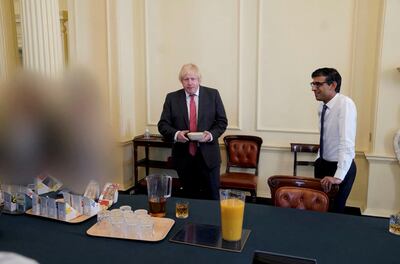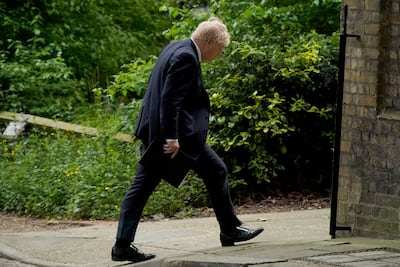It was when Theresa May walked out of the British Parliament chamber 34 minutes after her successor had started defending his lockdown breaches that it appeared Boris Johnson had survived the Sue Gray report.
The former UK prime minister had on Wednesday dressed in an eye-catching lilac trouser suit, seemingly to issue an eviscerating condemnation of Downing Street behaviour that she would never have tolerated.
Instead, she picked up her handbag, bowed to the Speaker and left, as her successor fended off yet another attempt to sully his reputation.
Ultimately, Ms Gray’s report did not provide Mr Johnson’s doubters in the Conservative Party with the ammunition to call for a vote of no confidence in his leadership.
There was no toxic phrase or revelation that would lead MPs to submit the 54 letters needed to trigger the leadership poll.

Perhaps his MPs were mindful that on Thursday it will probably be announced that the government will impose a £10 billion ($12.54bn) windfall tax on energy companies to help offset the rising fuel costs for hard-up people across the country. A leadership challenge would not be a good look.
Initially, it appears that Mr Johnson has managed to ride out the Partygate tempest, which earlier this year appeared perilously close to sinking his premiership.
The report
He was helped by a report that failed to condemn him much more than Ms Gray’s “update” published in January.
Certainly, some of the detail was deeply unpleasant for the British public who had suffered strict lockdowns and 177,000 Covid-19 deaths.
A culture of disrespect had clearly overtaken Downing Street, with staff believing that the very rules they had set did not apply to them.
A WhatsApp message from the Prime Minister’s private secretary stated “we seem to have got away with it”, in terms of media reporting on a drinks party that spilt into the Downing Street garden.
In parts, Ms Gray’s report was direct in its criticism, particularly of a pizza and prosecco party. “The event lasted for a number of hours,” she wrote. “There was excessive alcohol consumption by some individuals. One individual was sick. There was a minor altercation between two other individuals.”
The strongest attack on Mr Johnson was somewhat deflected. “The senior leadership at the centre, both political and official, must bear responsibility for this culture,” she said.
“The events that I investigated were attended by leaders in government. Many of these events should not have been allowed to happen.”
The public would be “dismayed that behaviour of this kind took place on this scale at the heart of government” she lamented, while people had the right “to expect the very highest standards”.
Aside from the abuse of cleaning and security staff at No 10, there were few salacious details: the final partygoer leaving at 4.20am on the evening of Prince Phillip's funeral.
The apology
The prime minister, along with Chancellor Rishi Sunak, were among the 83 people fined for lockdown breaches. Beyond the £100 penalty, Mr Johnson does not appear to be under any further sanctions, beyond a large amount of humility and apologies.
The prime minister’s swift “I renew my apology” for his own breach was followed by him taking “full responsibility for everything that took place on my watch”.
But that was it in terms of saying sorry. What came next was a clearly a well-planned defence to deflect detractors.
During 600 days of lockdown there had been only eight days in which Downing Street had witnessed rules broken.
Mr Johnson had only attended the events “to thank people for their service” and to “keep morale high”.
The prime minister, who received the report shortly after 10am on Wednesday, was “disappointed and appalled” by the behaviour of some officials “particularly the treatment of security and cleaning staff”.
But he quickly absolved himself from blame. “My attendance was not outside the rules,” he asserted, knowing that the police investigation had concluded with no further fines for him. “I believed I was attending work events”.

The lessons had been learnt, many of the offending staff had moved on and now that Ms Gray had reported, “we will be able to move on”, he said.
Hamstrung by his own police inquiry into alleged breach of lockdown rules, Sir Keir Starmer carried less menace in his attack. But he asserted that the Downing Street rule-breaking showed it regarded the British public with “utter contempt” as it was “one law for them and another for everyone else”.
In a later appearance before the media, Mr Johnson defended his staff by saying their hard work on purchasing safety equipment, Covid tests and vaccines had “saved many lives”.
“They did not think what they were doing was in conflict with the rules,” he suggested, then promised to “work every hour to ease the hardship” of rising living costs and the Ukraine war.
The outlook
Earlier, a delegation of foreign journalists was told it would be a “fascinating and historic day” with a potential putsch against Mr Johnson. They were instead treated to a raucous debating chamber that echoed to roars, shouts and at times laughter but little political intrigue.
They politely left Westminster perhaps more puzzled than illuminated by the eccentricities witnessed.
The sole act of rebellion came from Tobias Ellwood, chairman of the defence committee, who was the only Conservative with the steel to question Mr Johnson’s credibility.
“This is a damning report,” he declared, as fellow MPs squirmed behind him. “There was an absence of leadership at No 10” and a “culture of indiscipline under their watch”.
Mr Johnson waved away his single critic, promising MPs that he would win them the next general election.
Vladimir Putin’s decision to invade Ukraine has offered an issue the prime minister seized upon to demonstrate decisive leadership on the international stage at a time when Partygate had threatened to engulf him.
A final hurdle will be the investigation by the Commons’ standards and privileges committee on whether Mr Johnson deliberately misled Parliament over his denials last year of Downing Street partying.
But Wednesday proved he had full confidence in his ability to defend his actions.
Much as the opposition and indeed some in Conservative ranks would like to see him gone, ultimately Mr Johnson will survive the six-month debacle that has assailed his authority but not fatally so.


















